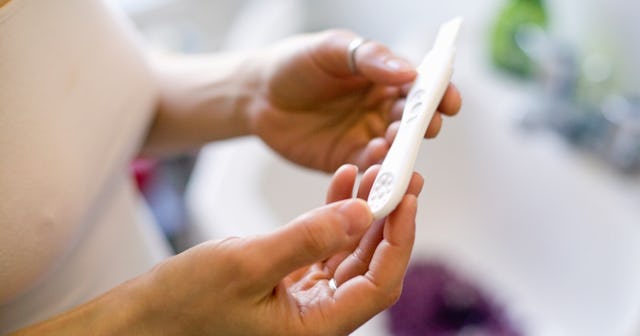What to (Really) Expect When You're 1 Month Pregnant

Your Body At 1 Month Pregnant
There Aren’t a Lot of Changes On the Surface
RELATED: Not Sure When To Take a Pregnancy Test? This Calculator Will Help
At one month pregnant, there aren’t many visible or noticeable changes to your body but things are definitely cooking on the inside. In fact, you may not even know you’re pregnant, especially if you have irregular periods.
Nevertheless, there’s a lot going on beneath the surface. Once a pregnancy test comes back positive, make an appointment with your OB-GYN and begin preparing for pregnancy and childbirth by taking a multivitamin supplement. Your doctor may also suggest making some dietary adjustments as well.
You Can Calculate Your Due Date
Because most pregnancies last around 40 weeks, you can calculate your due date by counting 40 weeks — or 280 days — from the first day of your last period.
There’s No “Baby Belly” Yet
You may be pregnant, but you’re not bumpin’ quite yet. Although you may experience some bloating during your first month of pregnancy, you won’t have a “baby belly” at this point.
Your Baby at 1 Month Pregnant
The Embryo Has Already Started Developing
Once the egg has fertilized (which happens at week four), implantation occurs. Implantation is when the egg burrows into the lining of your uterus. During week 4, the embryo forms three layers: the ectoderm, mesoderm, and the endoderm. The ectoderm will eventually form the nervous system, mammary glands, sweat glands, brain, skin, hair, and nails. The skeleton, muscles, heart, and blood system are formed by the mesoderm. Finally, the thyroid, pancreas, lungs, liver, and gastrointestinal system are developed by the endoderm.
As the fertilized egg grows, the amniotic sac forms around it and cushions the embryo. The placenta also begins to develop during the first month of pregnancy, ensuring that nutrients will be passed from you to the baby.
At the end of your first month of pregnancy, the teeny-tiny fetus is 0.078 inches long — smaller than a grain of rice. Although it doesn’t show in ultrasounds at this point, the embryo has also formed very, very small buds that will eventually grow into your baby’s arms and legs.
Your Early Pregnancy Symptoms and Health at 1 Month
A Missed Period
Unless you have irregular menstrual cycles, missing your period is typically the first noticeable sign of pregnancy.
Nausea & Morning Sickness
For some lucky ladies, these first trimester symptoms emerge during the first month of pregnancy. You may experience morning sickness (which can actually occur at any time of day) and nausea. And don’t be surprised if the mere smell of certain foods is enough to turn your stomach.
Tender, Swollen Breasts
Due to hormonal changes, your breasts may also be swollen and tender during the first month of pregnancy.
Fatigue
Fatigue is one of the most common early symptoms of pregnancy. Your levels of progesterone increase, resulting in tiredness. Lower blood sugar levels and lower blood pressure can also contribute to fatigue. So go ahead and take a nap — in less than nine months, you won’t have much time for shut-eye!
Read More:
2 Months Pregnant — Early Pregnancy Symptoms and Fetal Development
1-3 Weeks Pregnant — Not Quite Pregnant… Yet
4 Weeks Pregnant — How to Calculate Your Due Date
This article was originally published on